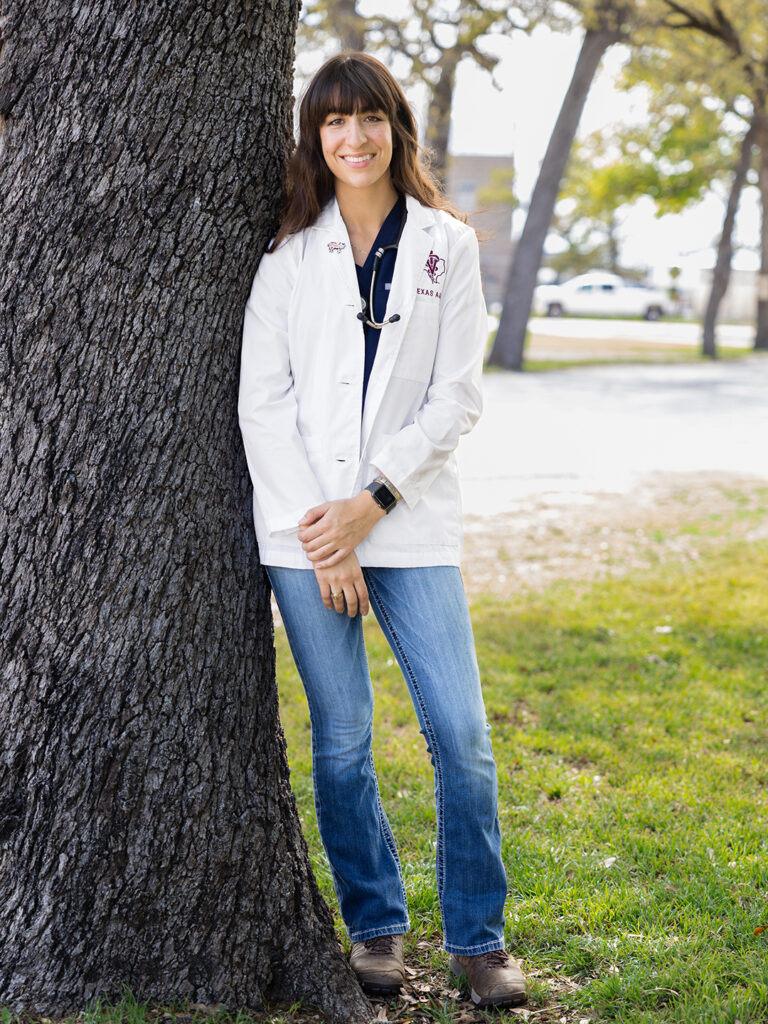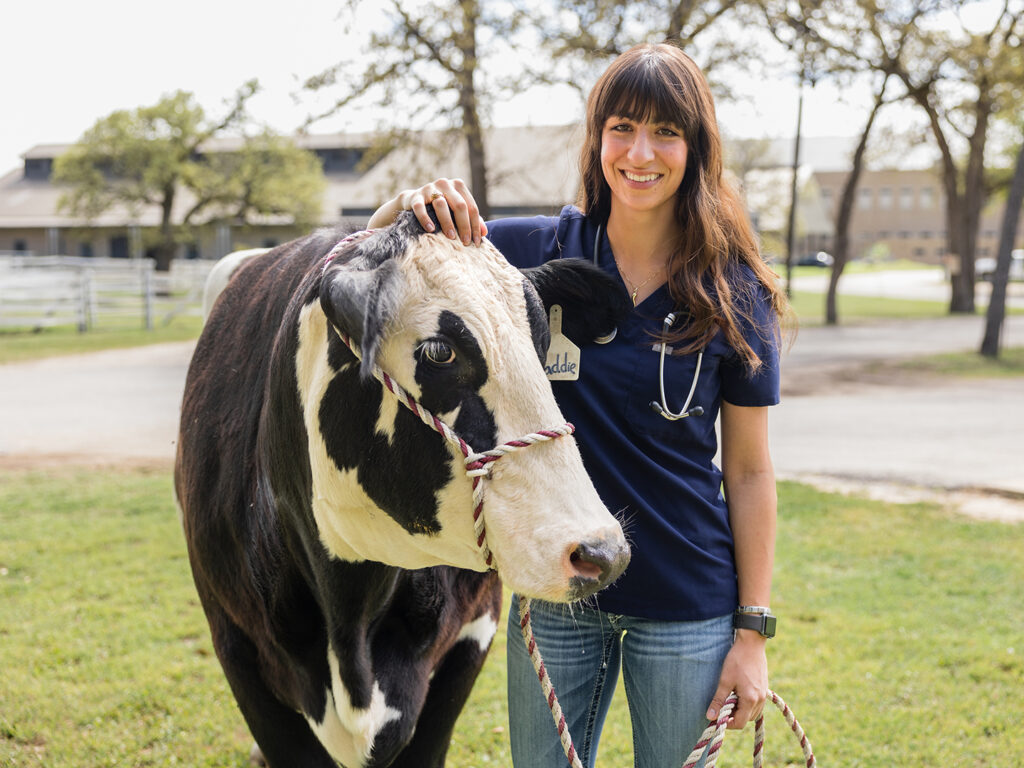Texas A&M Veterinary Student Combines Passions For Dairy Medicine, Public Health
Story by Megan Bennett, VMBS Communications

Photo by Jason Nitsch ’14, Texas A&M University Division of Marketing and Communications
When fourth-year veterinary student Angelica Allegro shadowed a dairy veterinarian for the first time in 2022, she immediately knew that the data-driven field of dairy medicine was where she wanted to spend her life.
As Allegro prepares to graduate from the Texas A&M College of Veterinary Medicine & Biomedical Sciences (VMBS) with her Doctor of Veterinary Medicine (DVM) degree this May, she looks forward to beginning a career that connects her interests in medicine and data analysis.
“Data analysis is a very central part of dairy medicine. Most dairies have an extensive record-keeping system, because when you have hundreds to thousands of animals on a single piece of property that are very intensely managed, you have to keep track of everything,” Allegro said. “With their records system, they can track reproductive rates and health events. Herd managers are really good about keeping track of data and working with veterinarians to help make evidence-based and data-driven decisions.”
Changing Course
Growing up near Detroit, Allegro always had an interest in becoming a veterinarian; however, for most of her life, her goal was to focus on horses, not dairy cows.
She fell in love with Texas A&M’s undergraduate animal science program while touring universities and moved to Texas after high school; she maintained her goal of becoming an equine veterinarian when she began veterinary school in 2020.
For most of her time at Texas A&M, as both an undergraduate and veterinary student, Allegro held a student worker position in the Equine Infectious Disease Laboratory under the leadership of Dr. Noah Cohen, a Distinguished Professor of large animal internal medicine. Although she first took the position because of her interest in horses, it would ultimately lead to a change in career paths, as it was there that Allegro was introduced to the world of epidemiology, public health, and data analysis.
During her time in Cohen’s lab, Allegro was a major contributor to a project that looked at SARS-CoV-2 infection in equine lung cells to determine whether horses are susceptible to the virus that causes COVID-19.
“Zoonotic diseases (those that affect both humans and animals) are really intriguing to me because species can be so different and yet share a similar disease-causing organism,” she said. “The intersection between human medicine and animal medicine is a cool and unique place to be, and veterinarians can bridge the gap between the two.”
As she continued her veterinary education, Allegro was encouraged to gain experience with food animals because they play a key role in public health.
Following that advice, she discovered another passion while completing an externship at a dairy medicine practice in California.
“That was my first introduction to dairy medicine, and it was very eye-opening,” she said. “The data analysis is what’s really attractive to me, but I also love dairy cows, dairy people, and dairy products. Getting to ride along with dairy vets every single day of the week and see what they do and what the industry is all about was a ‘trial by fire,’ in a sense, but also great for building the foundation for what was to come.”
Making The Most Of Every Moment

Photo by Jason Nitsch ’14, Texas A&M University Division of Marketing and Communications
During her four years of veterinary school, Allegro took every opportunity to expand her knowledge, invest in her passions, and spend time with like-minded people by taking on leadership roles in student organizations and meeting every learning opportunity with enthusiasm.
“One of my favorite memories was going with Dr. Kevin Washburn and a couple other students to a sale barn to examine the health condition of incoming cattle,” Allegro said. “We had a ton of fun getting to learn outside of school in a light-hearted and encouraging way. It was one of many little moments when it was very apparent that our professors care for us and want to help us develop our skills in any way, shape, or form.”
Fourth year also offers veterinary students many opportunities to gain hands-on experience during two-week clinical rotations offered at the Texas A&M Veterinary Medical Teaching Hospital and through externships at other institutions across Texas. As part of the production animal track, Allegro got to travel to the VMBS’ Veterinary Education, Research, & Outreach (VERO) campus in Canyon, Texas, for both a dairy rotation and a feedlot rotation.
“Both of those were amazing because the Texas Panhandle looks very different from College Station, and the number of beef and dairy cows up there is astronomical,” Allegro said. “We got to go see a lot of the large dairies in the Panhandle with around 10,000 cows in their milking herd. It was really cool to see how Texas dairies differ from those in the Midwest or Northeast.”
Looking To The Future
After commencement, Allegro will move to Minnesota to begin a position at a large animal practice that primarily treats dairy cattle.
Although Allegro plans to enjoy private practice for a while, she is open to one day pursuing additional training in public health and maybe even exploring the potential of a career with a regulatory agency like the World Health Organization or the Centers for Disease Control and Prevention.
But even now, by caring for the cattle that provide dairy products for people across America and beyond, Allegro will play an important role in public health by safeguarding her country’s food supply.
“Veterinarians have this unique perspective of being able to deal with multiple aspects of the One Health triad of people, animals, and the environment — we deal with agriculture, we deal directly with the animals, and we deal with human health,” she said. “We have such a pivotal role in public health, and I want to help expand that role and be a part of it in the future.”
###
For more information about the Texas A&M College of Veterinary Medicine & Biomedical Sciences, please visit our website at vetmed.tamu.edu or join us on Facebook, Instagram, and Twitter.
Contact Information: Jennifer Gauntt, Director of VMBS Communications, Texas A&M College of Veterinary Medicine & Biomedical Sciences, jgauntt@cvm.tamu.edu, 979-862-4216


